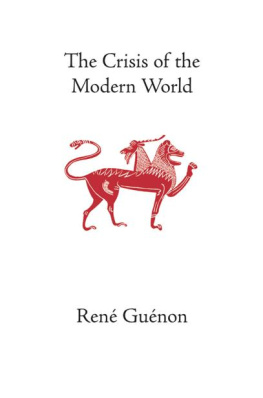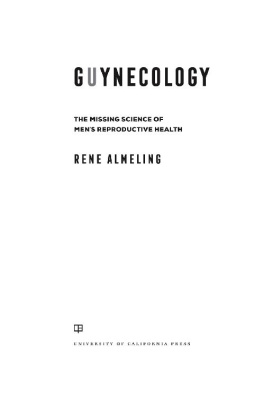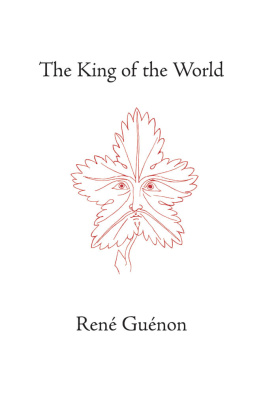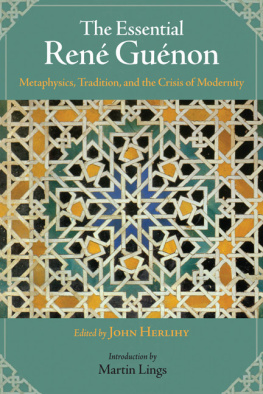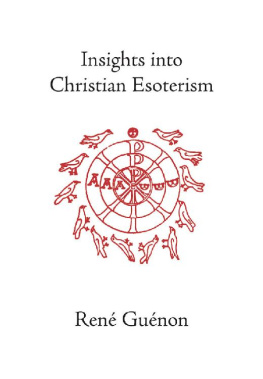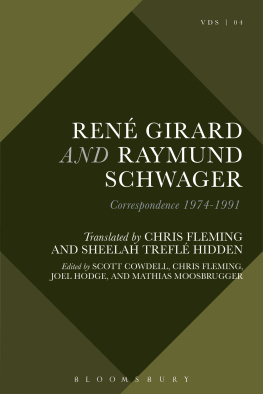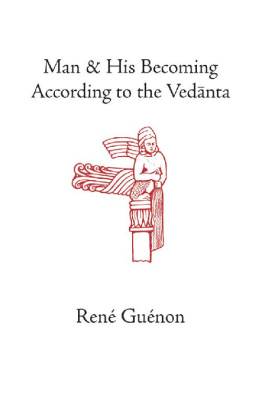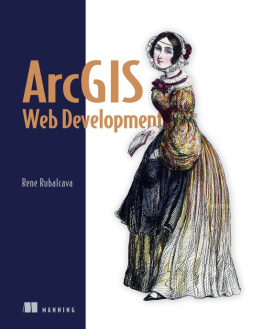René Guénon (Author) - The Crisis of the Modern World (The Collected Works of René Guénon)
Here you can read online René Guénon (Author) - The Crisis of the Modern World (The Collected Works of René Guénon) full text of the book (entire story) in english for free. Download pdf and epub, get meaning, cover and reviews about this ebook. year: 2017, publisher: Sophia Perennis, genre: Religion. Description of the work, (preface) as well as reviews are available. Best literature library LitArk.com created for fans of good reading and offers a wide selection of genres:
Romance novel
Science fiction
Adventure
Detective
Science
History
Home and family
Prose
Art
Politics
Computer
Non-fiction
Religion
Business
Children
Humor
Choose a favorite category and find really read worthwhile books. Enjoy immersion in the world of imagination, feel the emotions of the characters or learn something new for yourself, make an fascinating discovery.
- Book:The Crisis of the Modern World (The Collected Works of René Guénon)
- Author:
- Publisher:Sophia Perennis
- Genre:
- Year:2017
- Rating:3 / 5
- Favourites:Add to favourites
- Your mark:
- 60
- 1
- 2
- 3
- 4
- 5
The Crisis of the Modern World (The Collected Works of René Guénon): summary, description and annotation
We offer to read an annotation, description, summary or preface (depends on what the author of the book "The Crisis of the Modern World (The Collected Works of René Guénon)" wrote himself). If you haven't found the necessary information about the book — write in the comments, we will try to find it.
The Crisis of the Modern World (The Collected Works of René Guénon) — read online for free the complete book (whole text) full work
Below is the text of the book, divided by pages. System saving the place of the last page read, allows you to conveniently read the book "The Crisis of the Modern World (The Collected Works of René Guénon)" online for free, without having to search again every time where you left off. Put a bookmark, and you can go to the page where you finished reading at any time.
Font size:
Interval:
Bookmark:
COLLECTED WORKS OF REN GUNON
THE CRISIS OF THE MODERN WORLD
REN GUNON
THE CRISIS OF THE
MODERN WORLD
Translators
Marco Pallis
Arthur Osborne
Richard C. Nicholson
SOPHIA PERENNIS
HILLSDALE NY
Originally published in French as
La Crise du Monde Moderne
ditions Gallimard 1946
Fourth, revised edition 2001
(Second Impression 2004)
Third edition, Sophia Perennis, Ghent 1996
Second edition 1962, 1975, Luzac & Company, London
First edition 1942, Luzac and Company, London
English translation Sophia Perennis 2001
All rights reserved
Series editor: James R. Wetmore
No part of this book may be reproduced or transmitted,
in any form or by any means, without permission
For information, address:
Sophia Perennis, P.O. Box 611
Hillsdale NY 12529
sophiaperennis.com
Library of Congress Cataloging-in-Publication Data
Gunon, Ren
[La crise du monde moderne. English]
The crisis of the modern world / Ren Gunon ; translated by
Arthur Osborne, Marco Pallis, Richard C. Nicholson
p. cm. (Collected works of Ren Gunon)
Includes index.
ISBN 0 900588 241 (pbk: alk. paper)
ISBN 0 900588 50 0 (cloth: alk. paper)
1. Culture. 2. Civilization, Modern. 3. Evolution. I. Title
HM621.g8413 2001
306.094dc2001001094
CONTENTS
EDITORIAL NOTE
THE PAST CENTURY HAS WITNESSED an erosion of earlier cultural values as well as a blurring of the distinctive characteristics of the worlds traditional civilizations, giving rise to philosophic and moral relativism, multiculturalism, and dangerous fundamentalist reactions. As early as the 1920s, the French metaphysician Ren Gunon (18861951) had diagnosed these tendencies and presented what he believed to be the only possible reconciliation of the legitimate, although apparently conflicting, demands of outward religious forms, exoterisms, with their essential core, esoterism. His works are characterized by a foundational critique of the modern world coupled with a call for intellectual reform; a renewed examination of meta-physics, the traditional sciences, and symbolism, with special reference to the ultimate unanimity of all spiritual traditions; and finally, a call to the work of spiritual realization. Despite their wide influence, translation of Gunons works into English has so far been piecemeal. The Sophia Perennis edition is intended to fill the urgent need to present them in a more authoritative and systematic form. A complete list of Gunons works, given in the order of their original publication in French, follows this note.
Though first published in 1927, The Crisis of the Modern World bears reprinting unaltered and unannotated at the beginning of this new millenium, for it rests upon principles that stand outsideindeed determinethe conditions of time and space. What few particular illustrative points may be dated will be readily identified and put in perspective by those readers for whom Gunon intended the book. In this very important book, which has become a classic, Ren Gunon analyzes the crisis of our times from the metaphysical point of view. That is, it is diagnosed not as a degradation of morals, which is a perversion of the will, but as the degradation of knowledge, that is, a perversion of the intellect. Such intellectual analysis of present disorders is not merely a legitimate supplement to the moral approach with which we are more familiar: it is fundamentally necessary and it has been carried out in this book with profundity and penetration. Gunon often uses words or expressions set off in scare quotes. To avoid clutter, single quotation marks have been used throughout. As for transliterations, Gunon was more concerned with phonetic fidelity than academic usage. The system adopted here reflects the views of scholars familiar both with the languages and Gunons writings. Brackets indicate editorial insertions, or, within citations, Gunons additions. Wherever possible, references have been up-dated, and English editions substituted.
Two previous translations of The Crisis of the Modern World were consulted in the preparation of this edition, that of Arthur Osborne, first published in 1942, and that of Marco Pallis and Richard C. Nicholson, which included some revisions and deletions, and first appeared in 1962. The entire text was then restored and checked for accuracy and further revised by William Stoddart. For other assistance thanks go to Benjamin Hardman, Allan Dewar, and John Ahmed Herlihy. A special debt of thanks is owed to Cecil Bethell, who revised and proofread the text at several stages and provided the index. Cover design by Michael Buchino and Gray Henry, based on a drawing of a chimaera by Gunons friend and collaborator Ananda K. Coomaraswamy.
THE WORKS
OF REN GUNON
Introduction to the Study of the Hindu Doctrines (1921)
Theosophy: History of a Pseudo-Religion (1921)
The Spiritist Fallacy (1923)
East and West (1924)
Man and His Becoming according to the Vednta (1925)
The Esoterism of Dante (1925)
The Crisis of the Modern World (1927)
The King of the World (1927)
Spiritual Authority and Temporal Power (1929)
The Symbolism of the Cross (1931)
The Multiple States of the Being (1932)
The Reign of Quantity and the Signs of the Times (1945)
Perspectives on Initiation (1946)
The Great Triad (1946)
The Metaphysical Principles of the Infinitesimal Calculus (1946)
Initiation and Spiritual Realization (1952)
Insights into Christian Esoterism (1954)
Symbols of Sacred Science (1962)
Studies in Freemasonry and the Compagnonnage (1964)
Studies in Hinduism (1966)
Traditional Forms and Cosmic Cycles (1970)
Insights into Islamic Esoterism and Taoism (1973)
Reviews (1973)
Miscellanea (1976)
PREFACE
WHEN WRITING East and West a few years ago, we thought we had said all that was required, at least for the time being, concerning the questions dealt with in that book. Since then however events have succeeded one another at an ever increasing speed and, while this has not made it necessary to alter a single word of what we wrote at that time, it provides an opportunity for certain additional explanations and for the development of lines of thought that we did not feel called upon to stress in the first instance. These explanations have become all the more necessary because we have recently seen a distinctly aggressive reaffirmation of some of those very confusions we had already tried to dispel. For this reason, while carefully staying aloof from all controversy, it has seemed to us advisable to present matters once more in their true perspective. In this connection there are certain considerations, often of a quite elementary nature, which appear so alien to the vast majority of our contemporaries that in order to make them generally understood it is necessary to return to them again and again, presenting them in their various aspects and explaining more fully, as circumstances permit, any points likely to give rise to difficulties that could not always be foreseen from the outset.
The very title of the present volume calls for some initial explanation, if what it means is to be clearly understood and all misrepresentation prevented. Many no longer doubt the possibility of a world crisis, taking the latter word in its most usual acceptation, and this in itself marks a very noticeable change of outlook: by sheer force of circumstance certain illusions are beginning to vanish, and we cannot but rejoice that this is so, for it is at any rate a favorable symptom and a sign that a readjustment of the contemporary mentality is still possiblea glimmer of light as it werein the midst of the present chaos. For example, the belief in a never-ending progress, which until recently was held as a sort of inviolable and indisputable dogma, is no longer so widespread; there are those who perceive, though in a vague and confused manner, that the civilization of the West may not always go on developing in the same direction, but may some day reach a point where it will stop, or even be plunged in its entirety into some cataclysm. Such persons may not see clearly where the danger liesthe fantastic or puerile fears they sometimes express being proof enough that their minds still harbor many errorsbut it is already something that they realize there is a danger, even if it is felt rather than understood; and it is also something that they can conceive that this civilization, with which the moderns are so infatuated, holds no privileged position in the history of the world, and may easily encounter the same fate as has befallen many others that have already disappeared at more or less remote periods, some of them having left traces so slight as to be hardly noticeable, let alone recognizable.
Next pageFont size:
Interval:
Bookmark:
Similar books «The Crisis of the Modern World (The Collected Works of René Guénon)»
Look at similar books to The Crisis of the Modern World (The Collected Works of René Guénon). We have selected literature similar in name and meaning in the hope of providing readers with more options to find new, interesting, not yet read works.
Discussion, reviews of the book The Crisis of the Modern World (The Collected Works of René Guénon) and just readers' own opinions. Leave your comments, write what you think about the work, its meaning or the main characters. Specify what exactly you liked and what you didn't like, and why you think so.

